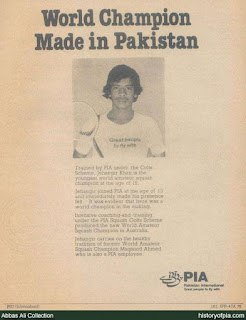AMAN FOUNDATION IN 2010's FLOOD RELIEF WORK - an interview with Ahsan Jamil (CEO, Aman Foundation)
Editor's Note - The flood season is around the corner, and it will do us well to revisit the experience obtained from the 2010 effort.
AMAN FOUNDATION IN FLOOD RELIEF WORK
Interviewed by Adil Ahmad, Editor, TCS CONNECT Corporate Magazine, January 2011
They were very quick out of the blocks and mobilized an international team of water paramedics, along with twenty Zodiac inflatable
watercrafts for rescue and relief work. I heard Ahsan Jamil (CEO, Aman
Foundation) talk live via telephone from Jacobabad to the assembly of expert
guests on Ayesha Tammy Haq’s talk show on the Business Plus TV channel. While
he came across as lucid and analytical, I could sense a quiet desperation in
his voice that conveyed an impression of being overwhelmed by circumstances,
and a tacit acceptance of the same.
“That was at the end of the first day of roaming 60
kilometers on the water and doing the rescue work. I was sitting in a single
cabin truck squashed between the foreign paramedic guy and the SSG officer, and
we were going to the PAF Base to meet the Base Commander. We needed to be able
to move to the next stage which was closer to Shahdadkot, but they couldn’t
give us security so we couldn’t move. So the next day we went to the relief
camp instead and provided medical treatment on the ground, going tent by tent
by tent, and was that an insight to the situation that I got! There was rampant
skin disease, people had Cholera and were in miserable shape. And it was so
very hot. There was mass poverty with people having lost their entire
livelihoods. Their crops had eight feet of water standing on them. Health is
our biggest single slippery slope.”
A brainchild of Arif Naqvi (Abraaj Capital) and his wife
Fayeeza, the Aman Foundation has $100 million backing its play, and a very
ambitious game-plan of which the ambulance service is just a curtain raiser.
Not quite a household name yet, but it is definitely getting there. The large,
distinctive, yellow ambulances plying the streets of Karachi portray the public face of the Aman
Foundation, a very professional, social enterprise backed by some very serious
money and management expertise that avow to make strategic changes in areas key
to social development – healthcare, nutrition, education and skills.
“Jacobabad was an incredible experience from a number of
perspectives,” continues Ahsan. “One had heard about it as the town where Pakistan ’s
highest temperatures are recorded. At the forefront of one’s mind was that the
entire city was surrounded by water with no land access. So we had to fly in,
and we had a team of water paramedics who had come in from the UK . We
had imported 20 boats of which 4 were deployed in Jacobabad and another four in
the Kambar Shahdatkot area, with the rest given to the Pakistan Navy. In
Jacobabad we were working with the PAF who operate an airbase there.
“The problems were constantly shifting with a very small
window of relief work. When the waters hit a certain place people had to be
shifted. In a lot of cases they were adamant not to be moved until the very
last moment when the situation became completely hopeless. People did not want
to leave because they were fearful of losing their property to which they
probably had no legal title, possession being nine parts of the law.
“We weren’t experts at this kind of work, and basically made
the quick decision to get what we thought would be needed. It took us a week to
get the boats. Seeing what had happened in the Punjab ,
and knowing that all of this would come down to Sindh, Arif Naqvi took the
initiative and ordered 10 boats and got the paramedics organized. When I went
to Dubai to meet with him he said that the boats
from UK were experiencing
delays so another 10 boats were purchased from Dubai .
“We had problems of Customs clearance that were really quite
silly. We had a UN approved team of very skilled volunteer coordinators who
helped us arrange the C-130 transport through UN channels. Granted that nobody
can be prepared for something like this, but we found the PDMA and NDMA to be a
bit slow in their reactions. To boot the NDMA declared in the middle of it all
that they were no longer legal! Their ordinance had lapsed and they could not
issue any letters of authority. This was bizarre! We lost two days before
getting into action. At that point the flood waters had hit only the northern
part of Sindh in Shikarpur and Jacobabad.
“All in all there were about 80 boats operating in Sindh of which
20 were ours. The Navy naturally played the lead role operating in some very
tough conditions. In Jacobabad it was 47 degrees Celcius and the rescuers were
in the water for 7 to 8 hours every day. It was the month of Ramazan, and the
advice from the Commandoes with us was not to fast. It was hard to keep oneself
hydrated. The sheer heat was incredible. As far as one could see there was
water. I felt like I was in the Arabian Sea .
There was over eight feet of water in most places, and not a drop to drink!
“There was a certain amount of chaos naturally. Jacobabad
was without food and clean water. Snakes and cholera were issues to be dealt
with. Then there was the task of coordinating with the PAF, DCO and DPO. People
working on the same problem were not talking to each other! There were tensions
between the civil and military bureaucracies. Our presence helped facilitate
dialogue. The big learning concerned the poverty of communications and teamwork
amongst those officially charged with the task of administration.
“If we didn’t get to a town within 48 to 72 hours of the
water hitting it, the rescue time is essentially over. There is a preparedness
that one must have. The rescue trip lasted five days, with the British
paramedics becoming more of a liability than an asset. There were threats by
the Punjabi Taliban against foreign relief workers, and while the PAF provided
the security on the behest of the UN they were limited in how much they could
do in the fast changing crisis environment. There is so much confusion in the
country regarding the flow of authority.
“With these 20 boats that we now have we are looking at
whether we can extend our ambulance service from the streets of Karachi to the shores of Karachi . In the Monsoon season we have so
many cases of drowning. So, in collaboration with the Navy we will keep these
boats functional year round rather than just waiting for a disaster to happen.
The skills sets need to be kept active otherwise they get lost.”




Comments
Post a Comment